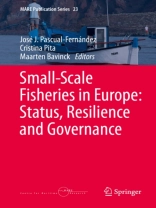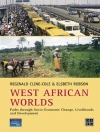This book offers a comprehensive account of the status and dynamics of people participating in the small-scale fisheries (SSF) of Europe. It covers the situation of SSF in 25 coastal countries, thereby providing a portrait of almost every coastal country on the continent and analyzing the recent evolution of the sector. Small-scale fisheries are argued to be extremely important in Europe, as they provide employment and welfare, while increasing food sovereignty and maintaining communities in coastal areas. The recent worldwide focus on SSF derives from their environmental sustainability, which distinguishes many of their activities from those of large-scale fisheries. This book analyses the diversity of SSF and shows how fishing communities have sometimes developed successful governing models, demonstrating social and economic resilience. While the book emphasizes the strengths of SSF and the synergies that occur with other marine sectors, it also presents cases of failure, in whichcollective action and policy have actually contributed to a weakening of the sector. In this context, the book shows how governmental policies toward SSF vary considerably from country to country, in a way that is not entirely consistent with European policies.
Inhoudsopgave
INTRODUCTION.- 1. Small-scale fisheries in Europe.-2. The evolution of the EU Common Fisheries Policy and small-scale fisheries: Fighting for recognition.- 3.Focusing on the problems and the management of small-scale fisheries in Greece: Myopia, presbyopia or astigmatism?.- 4. Small-scale fisheries in Spain: challenges and prospects.- 5. Small-scale fisheries in Portugal.- 6. The unexploited potential of Small Scale Fisheries in Italy: analysis and perspectives on the status and resilience of a neglected fishery sector.- 7. Small scale fisheries in France: activity and governance issues .- 8. How is fishery management perceived by Croatian small-scale fishermen: Should I stay or should I go? .- 9. Fishing in the NE Adriatic, Slovenia: from borders to projects.- 10. Governance and socio economic implications of the Black Sea small scale fisheries (Bulgaria).- 11. Small-scale fisheries in Romania: Transformation, vulnerability and change in a sturgeon fishermen community from the Danube Delta Biosphere Reserve (Romania).- 12. The current status and challenges facing the small-scale fisheries of Turkey.- 13.Small-scale fisheries in Malta: trends and challenges.- 14. Losing space: exploring the Blue Economy and the marginalisation of the small-scale fishers in Cyprus.- 15. Small-scale fisheries in the United Kingdom.-16. Learning from experience in Irish inshore fisheries management.-17. Small-scale fisheries in Iceland: Local voices and global complexities.-18. “…here in my heart” The important of small-scale fishing for Greenlandic society and as a way of life.- 19. Title Small-scale fisheries in Belgium.- 20. Small-scale fisheries in the Netherlands; learning from governance responses for a better future.-21. Small scale fisheries in Germany.- 22. Fisheries in Denmark.- 23. Who won, who lost within the Polish coastal fisheries.- 24. “Nice harbour but where are the fishers?” Critical insight into fisheries policies and its effects to small-scale fisheries in Estonia.- 25. Swedish small-scale fisheries in the Baltic Sea.- 26. Finnish small-scale fisheries: marginalization or revival? .- 27. Small scale fisheries in Norway.- 28. Challenges of governing coastal fisheries in Northwest Russia.- 29. Small-scale fisheries in Europe: tenure, markets, inclusiveness and governance challenges.- 30. The future of small-scale fisheries in Europe.
Over de auteur
José J. Pascual-Fernández is a Professor of Social Anthropology at the Universidad de La Laguna (Tenerife, Spain). His research has been related to fisheries and coastal zones, focusing on governance, gender, marine protected areas, coastal tourism, recreational marine activities, fisher organizations, and fisheries markets. In the last 10 years, he has been involved as a principal investigator at the ULL in more than 20 competitive projects or research contracts, including several involving market innovations in partnership with fisher organizations. He is currently the Director of the Institute of Social Research and Tourism (ISTUR) at ULL.
Cristina Pita, Ph D in Social and Environmental Sustainability, is a Senior Researcher at Center of Environmental and Marine Studies (CESAM) and the University of Aveiro, Portugal. She has been engaged in several projects and has published extensively on small-scale fisheries, seafood value chain and market initiatives for small-scale fisheries, fisheries governance, coastal community development, fisheries (commercial and recreational) management and socioeconomics, and sustainable use of marine resources.
Maarten Bavinck is a Professor in the Department of Geography, Planning and International Development Studies (GPIO) of the University of Amsterdam and a member of the Governance and Inclusive Development programme group. He also holds a chair in coastal resource governance at the Norwegian Fisheries College of Ui T – The Arctic University of Norway. Dr. Bavinck specializes in the governance of capture fisheries, particularly in the South, and is especially interested in the fate of small-scale fisher peoples. He is the founder and co-director of the social-science Centre for Maritime Studies (MARE).












